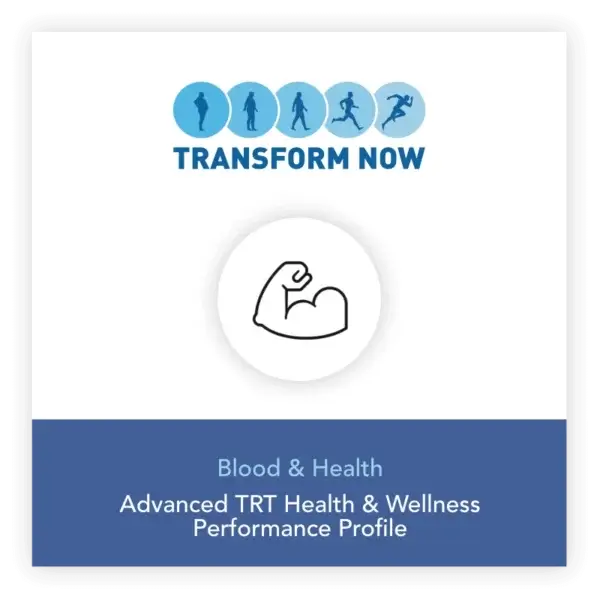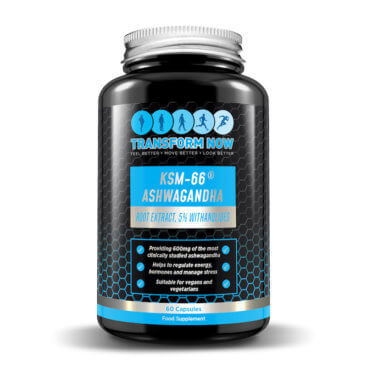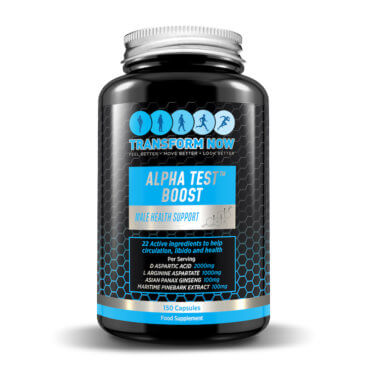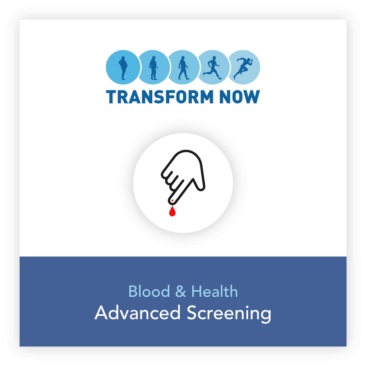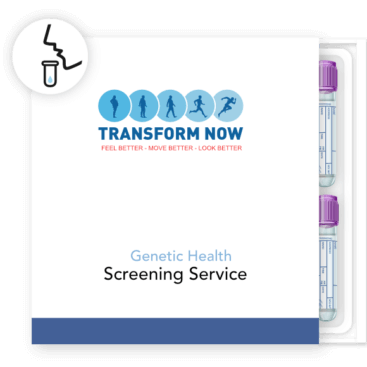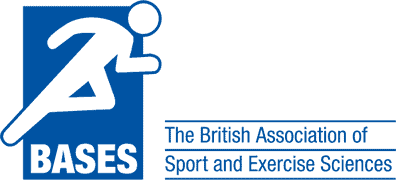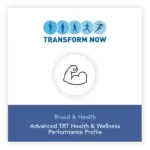Advanced TRT Health & Wellness Performance Profile
£250.00
Includes pre and post consultation after you receive your results to discuss any highlighted issues and recommend improvements to your diet and lifestyle.
Unlike standard hormone tests, this profile delivers a panel of 58 biomarkers to provide a complete picture of your health and the markers that influence testosterone production and overall wellness.
1. Full Blood Count (FBC) – Cellular Health & Immune Function
- Haemoglobin & Red Blood Cells (RBC): Oxygen delivery and energy levels
- Haematocrit: Measures blood thickness, which is vital for cardiovascular health
- Platelets: Essential for blood clotting and healing
- White Blood Cells (WBC): Indicators of immune strength and inflammation, including:
- Neutrophils: Bacterial defence and acute inflammation markers
- Lymphocytes: Key indicators of viral infections and immune health
- Monocytes: Chronic inflammation markers and tissue repair agents
- Eosinophils: Indicators of allergic responses and parasitic infections
- Basophils: Markers of allergic reactions and long-term inflammation
2. Biochemistry Panel – Nutritional Status & Metabolic Health
- Albumin & Total Protein: Indicators of liver function and nutritional status
- Globulin: Helps assess immune system activity and inflammation
- HbA1c (Glycated Haemoglobin): A 3-month average of blood sugar levels essential for detecting pre-diabetes and insulin resistance
- Iron Studies (Iron, Ferritin, TIBC): Crucial for energy production and oxygen transport. Low ferritin can mimic symptoms of low testosterone
3. Thyroid Function – The Hormone Regulator
- TSH (Thyroid Stimulating Hormone): Primary marker for thyroid function
- Free T4 (Thyroxine) & Free T3 (Triiodothyronine): Active thyroid hormones critical for metabolism and energy
- Reverse T3 (if applicable): Assesses thyroid conversion issues, which can cause fatigue and low libido
- Why this matters: Thyroid imbalances often mirror testosterone deficiency symptoms (e.g., fatigue, low mood, and reduced libido) and can suppress testosterone production.
4. Kidney Function – Detoxification & Fluid Balance
- Urea & Creatinine: Indicators of kidney filtration efficiency
- eGFR (Estimated Glomerular Filtration Rate): Assesses kidney function and overall detox capacity
- Sodium & Electrolytes: Key markers for hydration and adrenal health
5. Liver Function Panel – Detox Pathways & Hormone Metabolism
- ALT, AST, ALP, GGT: Liver enzymes that indicate liver stress or damage
- Bilirubin: Evaluates liver and bile duct function
- Albumin & Total Protein: Important for nutrient transport and tissue repair
- Why this matters: The liver plays a key role in metabolizing hormones. A sluggish liver can lead to poor testosterone clearance and estrogen dominance.
6. Lipid Profile – Cardiovascular Health & Hormonal Balance
- Total Cholesterol, HDL, LDL, Triglycerides: Markers of heart health and metabolic status
- Cholesterol: The building block for testosterone and other hormones
- Why this matters: Low cholesterol can impair testosterone production, while a poor lipid profile may signal insulin resistance, a common cause of low testosterone.
7. Complete Hormonal Panel – Testosterone and Beyond
- Total Testosterone: Measures overall testosterone in your blood
- Free Testosterone: The active form available to your cells (crucial for energy and libido)
- SHBG (Sex Hormone Binding Globulin): Regulates free testosterone availability
- Free Androgen Index (FAI): A ratio to assess bioavailable testosterone
- DHEA-S (if included): A precursor hormone that supports testosterone production
- Prolactin: High levels can suppress testosterone and signal underlying issues
- Cortisol (Morning): A stress hormone that, when elevated, can suppress testosterone
- FSH & LH: Pituitary hormones that regulate natural testosterone production
- Oestradiol (Estrogen): Elevated levels can lead to symptoms of testosterone imbalance
- Why this matters: True hormone balance is about ratios, not just numbers. A comprehensive view ensures we address root causes, not just symptoms.
8. Key Nutrient & Inflammatory Markers – Foundations of Hormonal Health
- Vitamin D: Essential for testosterone production and immune function
- Vitamin B12 & Folate: Vital for energy production and nerve health
- CRP (C-reactive protein): Marker of systemic inflammation
- Homocysteine: Indicator of cardiovascular risk and B-vitamin status
- Omega-3 Index (if applicable): Essential fatty acid balance for hormone production
